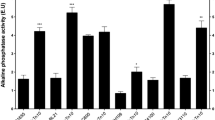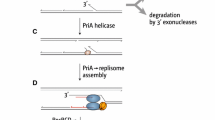Summary
We have studied the role of DNA replication in turnon and turn-off of the SOS response in Escherichia coli using a recA::lac fusion to measure levels of recA expression.
An active replication fork does not seem to be necessary for mitomycin C induced recA expression: a dnaA43 initiation defective mutant, which does not induce the SOS response at non-permissive temperature, remains mitomycin C inducible after the period of residual DNA synthesis. This induction seems to be dnaC dependent since in a dnaC325 mutant recA expression not only is not induced at 42° C but becomes mitomycin C non-inducible after the period of residual synthesis.
Unscheduled halts in DNA replication, generally considered the primary inducing event, are not sufficient to induce the SOS response: no increase in recA expression was observed in dnaG(Ts) mutants cultivated at non-permissive temperature. The replication fork is nonetheless involved in induction, as seen by the increased spontaneous level of recA expression in these strains at permissive temperature.
Turn-off of SOS functions can be extremely rapid: induction of recA expression by thymine starvation is reversed within 10 min after restoration of normal DNA replication. We conclude that the factors involved in induction-activated RecA (protease) and the activating molecule (effector)-do not persist in the presence of normal DNA replication.
Similar content being viewed by others
Abbreviations
- Ts:
-
thermosensitive
- SDS:
-
sodium dodecyl sulfate
- Ap:
-
ampicillin
- UV:
-
ultraviolet
- X-Gal:
-
5-bromo-4-chloro-3-indolyl-β-D-galactoside
References
Bouché JP, Zechel K, Kornberg A (1975) dnaG gene product, a rifampicin-resistant RNA polymerase initiated the conversion of a single stranded coliphage DNA to its duplex replicative form. J Biol Chem 250:5995–6001
Brent R, Ptashne M (1980) The lexA gene product represses its own promoter. Proc Natl Acad Sci USA 77:1932–1936
Brent R, Ptashne M (1981) Mechanism of action of the lexA gene product. Proc Natl Acad Sci USA 78:4204–4208
Carl PL (1970) Escherichia coli mutants with temperature sensitive synthesis of DNA. Mol Gen Genet 109:107–122
Casaregola S, D'Ari R, Huisman O (1982) Quantitative evaluation of recA gene expression in Escherichia coli. Mol Gen Genet 185:430–439
Cieśla Z, Jonczyk P (1980) The dnaA gene product is not required during stable chromosome replication in Escherichia coli. Mol Gen Genet 180:617–620
Craig NL, Roberts JW (1980) E. coli recA protein-directed cleavage of phage λ repressor requires polynucleotide. Nature 283:26–30
Csonka LN, Clark AJ (1980) Construction of an Hfr strain useful for transferring recA mutations between Escherichia coli strains. J Bacteriol 143:529–530
D'Ari R, George J, Huisman O (1979) Suppression of tif mediated induction of SOS functions in Escherichia coli by an altered dnaB protein. J Bacteriol 140:381–387
Emmerson PT, West SL (1977) Identification of protein X of Escherichia coli as the recA +/tif+gene product. Mol Gen Genet 155:77–85
Devoret R (1978) Inducible error-prone repair: one of the cellular responses to DNA damage. Biochimie 60:1135–1140
Gudas LJ, Mount DW (1977) Identification of the recA(tif) gene product of Escherichia coli. Proc Natl Acad Sci USA 74:5280–5284
Gudas LJ, Pardee AS (1976) DNA synthesis inhibition and the induction of protein X in Escherichia coli. J Mol Biol 101:459–477
Hirota Y, Mordoh J, Jacob F (1970) On the process of cellular division in Escherichia coli III. Thermosensitive mutants of Escherichia coli altered in the process of DNA initiation. J Mol Biol 53:369–387
Howard-Flanders P, Theriot L (1962) A method for selecting radiationsensitive mutants of Escherichia coli. Genetics 47:1219–1224
Inouye M, Pardee AB (1970) Changes of membrane proteins and their relation to deoxyribonucleic acid synthesis and cell division of E. coli. J Biol Chem 245:5813–5819
Kogoma T, Lark KG (1970) DNA replication in Escherichia coli: replication in “absence” of protein synthesis after replication inhibition. J Mol Biol 52:143–164
Kogoma T, Lark KG (1975) Characterization of the replication of Escherichia coli DNA in the absence of protein synthesis: stable DNA replication. J Mol Biol 94:243–256
Kogoma T, Torrey TA, Connaughton MJ (1979) Induction of UV-resistant DNA replication in Escherichia coli: induced stable DNA replication as an SOS function. Mol Gen Genet 176:1–9
Kohiyama M (1968) DNA synthesis in temperature sensitive mutants of Escherichia coli. Cold Spring Harbor Symp Quant Biol 33:317–324
Lark KG, Lark CA (1978) recA dependent DNA replication in the absence of protein synthesis: characteristics of a dominant lethal replication mutation, dnaT, and requirement for recA function. Cold Spring Harbor Symp Quant Biol 43:537–549
Little JW, Edmiston SM, Pacelli LZ, Mount DW (1980) Cleavage of the Escherichia coli lexA protein by the recA protease. Proc Natl Acad Sci USA 77:3225–3229
Little JW, Hanawalt PC (1977) Induction of protein X in Escherichia coli. Mol Gen Genet 150:237–248
Little JW, Harper JE (1979) Identification of the lexA gene product of Escherichia coli K-12. Proc Natl Acad Sci 76:6147–6151
Little JW, Mount DW, Yanisch-Perron C (1981) Purified lexA protein is a repressor of the recA and lexA genes. Proc Natl Acad Sci USA 78:4199–4203
Louarn JM (1974) Size distribution and molecular polarity of nascent DNA in a temperature-sensitive dnaG mutant of Escherichia coli. Mol Gen Genet 133:193–200
McEntee K (1977) Protein X is the product of the recA gene of Escherichia coli. Proc Natl Acad Sci USA 74:5275–5279
Melechen NE, Go G (1980) Induction of lambdoïd prophages by amino acid deprivation: differential inducibility; roles of recA. Mol Gen Genet 180:147–155
Monk M, Gross J (1971) Induction of prophage λ in a mutant of E. coli K12 defective in initiation of DNA replication at high temperature. Mol Gen Genet 110:299–306
Oishi M, Smith CL (1978) Inactivation of phage repressor in a permeable cell system: role of recBC DNase in induction. Proc Natl Acad Sci USA 75:3569–3573
Phizicky EM, Roberts JW (1981) Induction of SOS functions: regulation of proteolytic activity of E. coli RecA protein by interaction with DNA and nucleoside triphosphate. Cell 25:259–267
Radman M (1975) SOS repair hypothesis of an inducible DNA repair which is accompanied by mutagenesis. In: Hanawalt P, Setlow RB (eds) Molecular mechanisms for repair of DNA, part A. Plenum Press, New York, p 355
Roberts JW, Roberts CW, Craig NL (1978) Escherichia coli recA gene product inactivates phage λ repressor. Proc Natl Acad Sci USA 75:4714–4718
Satta G, Pardee AB (1978) Inhibition of Escherichia coli division by protein X. J Bacteriol 133:1492–1500
Smith CL, Oishi M (1978) Early events and mechanisms in the induction of bacterial SOS functions: analysis of the phage repressor inactivation process in vivo. Proc Natl Acad Sci USA 75:1657–1661
Schuster M, Beyersmann D, Mikolajczyk M, Schlicht M (1973) Prophage induction by high temperature in thermosensitive dna mutants lysogenic for bacteriophage lambda. J Virol 11:879–885
Wechsler JA, Gross JD (1971) Escherichia coli mutants temperature sensitive for DNA synthesis. Mol Gen Genet 113:273–284
Wickner S (1977) DNA or RNA priming of bacteriophage G4 DNA synthesis by Escherichia coli dnaG protein. Proc Natl Acad Sci USA 74:2815–2819
Witkin EM (1976) Ultra-violet mutagenesis and inducible DNA repair in Escherichia coli. Bacteriol Rev 40:869–907
Wolf B (1972) The characterization and genetic map location of a temperature sensitive DNA mutant of E. coli K12. Genetics 72:569–593
Author information
Authors and Affiliations
Additional information
Communicated by B.A. Bridges
Rights and permissions
About this article
Cite this article
Casaregola, S., D'Ari, R. & Huisman, O. Role of DNA replication in the induction and turn-off of the SOS response in Escherichia coli . Mol Gen Genet 185, 440–444 (1982). https://doi.org/10.1007/BF00334136
Received:
Issue Date:
DOI: https://doi.org/10.1007/BF00334136




